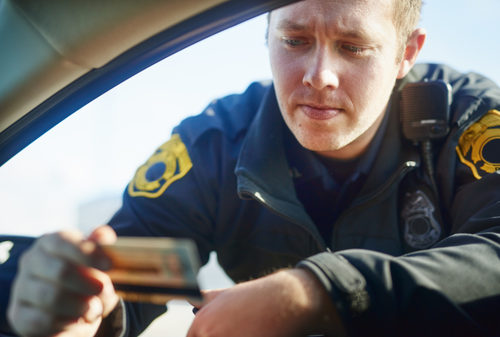Navigating a DUI checkpoint can be a daunting experience for many drivers. DUI checkpoints are one of the primary tools law enforcement officers in Florida use to deter impaired driving, particularly during holidays or late-night hours.
As a criminal defense law firm in Ponte Vedra Beach, FL, our DUI defense lawyers at Malcolm Anthony, PA, want to ensure you are informed and prepared should you encounter one of these checkpoints. Understanding the process not only helps you protect your rights but also prevents you from facing unnecessary legal trouble.
We’ll delve into everything you need to know about DUI checkpoints in Florida—from how they are set up, to your rights and how to handle the situation if you’re stopped.
1. What is a DUI Checkpoint?
A DUI checkpoint is a predetermined hotspot where traffic officers stop cars to check for impaired drivers. These checkpoints are set up to deter people from driving under the influence of alcohol or drugs and to catch those who are driving impaired. The main goal is to keep our roads safe and prevent accidents that could result from impaired driving.
In Florida, DUI checkpoints are legal and have been upheld by the courts. They are authorized by the U.S. Constitution, provided they are carried out in compliance with certain guidelines. The checkpoints must be conducted in a manner that doesn’t violate constitutional rights, and they must be publicly announced in advance to avoid arbitrary or discriminatory stops.
2. How DUI Checkpoints Are Set Up
DUI checkpoints are usually set up in areas with high traffic volume or in locations where officers have observed a higher rate of DUI arrests or accidents. These locations might include busy intersections, highways, or areas known for nightlife, as well as on holidays or weekends when impaired driving is more prevalent.
Late-night hours, particularly from midnight to 4 a.m., are prime times for DUI checkpoints, as they target those most likely to drive after drinking.
Before any checkpoint is set up, law enforcement agencies must obtain approval from the local authorities, and they are required to follow specific procedures to ensure fairness. In Florida, it’s also required that the public be notified in advance about the location of DUI checkpoints.
This is typically done through local media outlets, public announcements, or official law enforcement websites, making it clear where checkpoints will be placed.
3. What Happens When You Approach a DUI Checkpoint?
When you approach a DUI checkpoint, expect the following sequence of events:
- Initial Stop by Officers: You will be stopped by one or more officers as you approach the checkpoint. They may have you pull over to the side of the road or stop in a designated area. At this point, it’s important to remain calm and patient.
- Request for License, Registration, and Proof of Insurance: The officer will typically ask for your driver’s license, vehicle registration, and proof of insurance. These are standard documents that every driver should have ready when approaching a checkpoint. The officer may also ask you to roll down your window or provide identification.
- Brief Questioning About Alcohol or Drug Consumption: Next, the officer may ask you a few basic questions such as, “Have you been drinking tonight?” or “Do you feel okay to drive?” It’s crucial to answer these questions carefully. While you aren’t legally required to admit whether you’ve been drinking, you should remain polite and respectful.
- Officer Observations During the Interaction: While speaking with you, the officer will observe your behavior to see if there are signs of impairment. This might include things like the smell of alcohol on your breath, slurred speech, or difficulty with motor coordination. If the officer detects signs that you might be impaired, they may proceed with further testing.
4. Field Sobriety and Breathalyzer Tests
If the officer suspects you might be impaired, they may subject you to a number of field sobriety tests. These tests are designed to assess your coordination and balance. Common tests include:
- Walk and Turn Test: Walking heel-to-toe in a straight line.
- One-Leg Stand Test: Balancing on one leg for a set period of time.
- Horizontal Gaze Nystagmus (HGN) Test: The officer moves a pen or light to see if your eyes can track it smoothly.
It’s important to note that field sobriety tests are voluntary. You are not required by law to perform them, but refusing could raise suspicion and may lead to further consequences. If you refuse, the officer may still arrest you based on their observations.
If the officer has reasonable cause, they may also ask you to take a breathalyzer test. Under Florida’s Implied Consent Law, you are required to take a breath test if asked by law enforcement. Refusing to take a breath test can result in immediate penalties, including automatic suspension of your driver’s license for up to one year for the first refusal and even longer for subsequent refusals.
5. What Are Your Rights at a DUI Checkpoint?
At a DUI checkpoint, it’s crucial to know your rights. Some of them include:
- Right to Remain Silent: You can decline to answer questions that may incriminate you.
- Refusal of Field Sobriety Tests: Although you have precedence to refuse these tests without immediate legal penalties, it may lead to an arrest if officers have probable cause.
- Right to Refuse a Search of Your Vehicle: Unless the officer has probable cause or a warrant, they cannot search your vehicle without your consent. You can politely refuse, but be aware that refusal could make the situation tense.
6. How to Handle a DUI Checkpoint Stop
While DUI checkpoints can be stressful, staying calm and cooperative is key to avoiding further complications. Here are some tips:
- Stay Calm and Respectful: Even if you feel the stop is unnecessary, always remain calm and respectful. Uncooperative or aggressive behavior can lead to further suspicion and possibly even an arrest.
- Answer Questions Carefully: You have the right to remain silent, so if you’re unsure of how to answer a question, it’s better to remain quiet than to potentially incriminate yourself.
- Document the Encounter: If you believe the stop or process was unlawful, or if you feel that your rights were violated, write down as many details as you can about the encounter once you’re able to. Take note of the officer’s name, badge number, and any other relevant details.
7. What Happens If You’re Arrested at a Checkpoint?
If you are arrested for DUI at a checkpoint, you will be taken into custody, where you’ll be required to submit to a breath test if you haven’t already. The officer will explain the charges, and you will be booked into jail. You’ll also face penalties such as license suspension, fines, and potentially jail time, depending on the severity of the offense.
Once arrested, it’s crucial to contact an experienced DUI defense attorney immediately. At Malcolm Anthony, PA, we can help you understand your legal options and build a strong defense. We will work tirelessly to protect your rights and minimize the consequences you face.
Consult Seasoned Ponte Vedra Beach DUI Defense Attorneys To Protect Your Rights Today!
Understanding what to expect at a DUI checkpoint can significantly ease anxiety and help you navigate the situation with confidence. Remember that while these checkpoints serve an important public safety function, knowing your rights is essential in protecting yourself legally.
Should you find yourself facing charges following an encounter at a DUI checkpoint, don’t hesitate to reach out for legal assistance. At Malcolm Anthony, PA, we are committed to defending your rights and providing the guidance you need during this challenging time.
For more information regarding DUI charges in Ponte Vedra Beach, contact us now at (904) 285-4529 to get a FREE strategy and case review!



